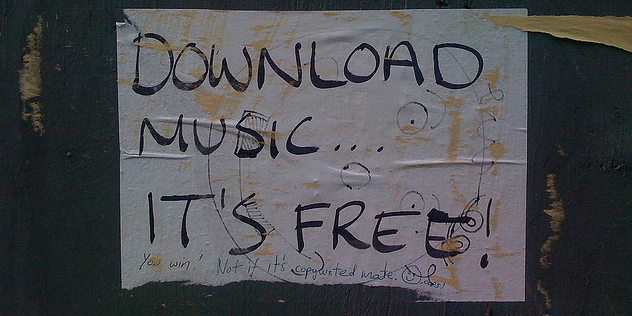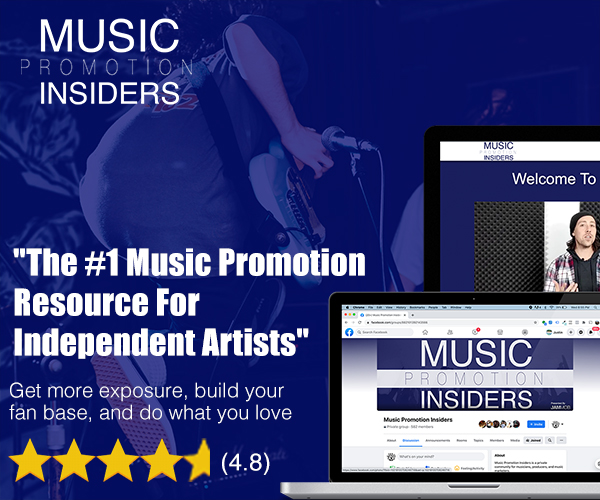In the modern age of digital media, it’s getting easier and easier for your fans to download music for free.
In fact, the majority of your fans aren’t going to buy anything the first few times they visit your website, Facebook page, or online store.
You shouldn’t expect your fans to start spending money on your music, concert tickets, or other merchandise right away. The key to getting your fans to spend money with you is to build a relationship with them and deliver a ton of value before ever asking for anything in return.
Get the email
Your fans may not be willing to pull out their wallets at first, but they might give you their email address.
Capturing your fans’ email addresses should be a central focus for your band’s online marketing strategy. If handled correctly, your email list could easily turn into your greatest source of income.
Three stages to residual income online…
- Capture Lead
- Build A Relationship
- Sell Your Music/Merchandise
Capturing Leads
The first step to getting started with a proper email marketing campaign is to sign up for an email marketing service like Aweber.
With Aweber, you can create custom email opt-in forms, set an auto-responder to send an automated message when someone submits their email, and create follow up and broadcast emails to go out to your fans.
This video gives a brief overview of how Aweber works…
Incentivizing opt-ins
Keep in mind that it’s not usually enough just to ask your fans for their email addresses. In order to ensure that you collect as many emails as possible, you’ll want to be sure to incentivize your fans to opt-in to your email list.
The incentive doesn’t need to be anything crazy. Something as simple as an exclusive track download or a subscription to your band’s newsletter is usually enough to start growing your email list.
Build A Relationship
The reason you want to collect your fans’ email addresses is so you can communicate directly with your fans on a regular basis. This is a very powerful marketing tool, and you should manage it properly. Your primary goal should be to make your fans feel like they know you. Don't abuse your relationship with your fans by over-promoting. Focus on giving value.

Holding Hands | Photo: Gem Fountain /Flickr/Creative Commons License
Don’t let your list get cold
Make sure that you don’t let too much time pass between emails. If your list goes for too long without hearing from you, they will become less likely to open your emails.
Try not to go more than a week or two without sending something out to your list. At the same time, you probably don’t want to email your fans more than once every day or two at most.
Give your fans a ton of value
Whenever possible, send your fans something cool that you think they’ll appreciate. Give away a lot of freebies to your email list. The more value you give to your list, the more likely they are to open your emails.
Conditioning your fans to open your emails will ensure that they open the ones that are going to make you money when it comes time to start promoting.
Give your fans more value
You can’t overdo it when it comes to delivering value. You’re fans aren’t going to get mad at you for constantly giving them free stuff.
Sell Your Music/Merchandise
From time to time you will want to promote your music, tour dates, album releases or your band’s official merchandise to your list. If you don’t do this, you will never make any money from your email list.

CD Store | Photo: Mterzian /Flickr/Creative Commons License
If you’ve been keeping up with your list, emailing them at least every week or two, and giving a ton of great value, you’re on track to getting great results when it comes time to promote stuff that will make you $$$.
Here are a few more tips that will help you generate more sales with your email promotions…
Exclusivity
Everybody likes to be a “cool insider” that gets exclusive access to things that aren’t available to most people. Exclusivity is how trendy LA nightclubs can charge thousands of dollars to get into the VIP section. It’s also how you can increase your sales when promoting to your email list.
Offering fans something that they can’t get anywhere else adds an additional incentive that can get them to make a purchase.
There are different types of exclusivity.
One type of exclusivity is something that your fans can only get by subscribing to your email list. You can offer fans something that is not, and will never be, available anywhere else. An example might be an exclusive remix of a track that’s only available to your fan club members.
Another way that you can give something exclusivity, is by offering it to your list first. For example, you can release your next album a week early to fans that are on your email list. In this case, the promotional offer will be available somewhere else, but the early access creates an exclusive privilege that’s only offered to your subscribers.
Here's a good example from Soundgarden's website. Notice in particular that they offer "EXCLUSIVE access to pre-sale tickets" for anyone who signs up for their FREE fanclub.

Exclusivity is not just a great way to incentivize your fans to make a purchase. Keep in mind that exclusive offers are also good incentives for getting people to sign up to your list in the first place.
Now let’s look at another way to improve your promotions.
Scarcity
Offering a deal for only a limited number of people, or making a deal available only for a limited time, will make your fans more likely to take action and buy right away. (Notice that Soundgarden also uses scarcity with the phrase, "Free for a limited time")
Part of the time, your fans intend to make a purchase when they first see something you’re promoting. A problem that often arises is that sometimes they decide to come back and get it later. The trouble is that they quite often don’t come back.
Your fans sometimes get caught up in the heat of the moment when reading your promotional email. They get excited about what you’re offering, but for whatever reason, they decide to go do something else and come back and buy later. Unfortunately, later they will not be as caught up in the heat of excitement, and it’s highly likely that they will no longer be interested in making a purchase.
You can avoid losing out on a lot of sales by creating a sense of urgency that will make your fans want to buy immediately. The key is to create a feeling of scarcity. Let your fans know that if they don’t purchase NOW, they may never have another opportunity to get the thing that you’re promoting.

Buy Now | Photo: Daniel*1977 /Flickr/Creative Commons License
One way to create scarcity is to only offer something for a limited time. Let your fans know that this item is only going to be available for a fixed amount of time. The less time that it’s available, the greater the sense of urgency to purchase will be.
Another way to create scarcity is to limit the amount that you’re willing to make available. If you only release 500 copies of a limited edition remix album, your fans will be more likely to buy it right away to avoid missing out on the opportunity.
So if you want to maximize the number of fans that make a purchase when you promote something to them, be sure to create a feeling of exclusivity and scarcity. You will be amazed at how much more effective your email promotions will be if you do those two things.
Residual Income Is Right Around The Corner
The simple steps outlined above should be enough to get you started on the path to earning a good residual income by promoting your music online. Just remember the 3-step formula…
- Capture Lead
- Build A Relationship
- Sell Your Music/Merchandise
That simple formula is the framework for every successful email marketing campaign. There are many ways to improve and expand on each step in the formula, which is something that I will address in more detail in future posts.
For now, you should have enough information to get started with your online promotions. I hope this post has been helpful.
If you have any questions, please leave them in the comments section below.
Featured Image: Download Music | Photo: Iain Tait /Flickr/Creative Commons License



